Get started with the Trezor Model One
The Trezor Model One is no longer sold, but will continue to receive maintenance until at least 2031 and critical security fixes until at least 2036, ensuring your device stays secure and fully supported. Learn more here.
This guide shows you how to unbox, connect, and set up your new Trezor Model One in about 15 minutes.
If you’re new to or want extra guidance, you can book a one on one onboarding session with a Trezor Expert. They will walk you through setup and answer questions.
Trezor Expert Onboarding Session
session with Trezor Expert
Trezor Model One setup is only available using Trezor Suite Desktop. We recommend downloading the desktop app for the best experience. If you only have an Android phone, you can use the web version at suite.trezor.io/web. iPhone users cannot set up Model One as iOS does not support USB connections for Trezor devices.
Choose mobile or desktop setup below.
What you'll need
- Your Trezor Model One
- Micro-USB cable: for connecting your device to your computer
- The included wallet backup cards and a pen
- About 15 minutes
- A computer with Trezor Suite installed (or access to the web app at suite.trezor.io/web)
Your backup cards say "recovery seed" - this is the same as "wallet backup." Learn more.
1. Install and run Trezor Suite
If you don’t have installed yet go to trezor.io/start and click Download for desktop.
Once the installation is finished, open Trezor Suite.
2. Plug in and verify your Trezor
When Trezor Suite opens, you’ll see “Connect & unlock your Trezor.”
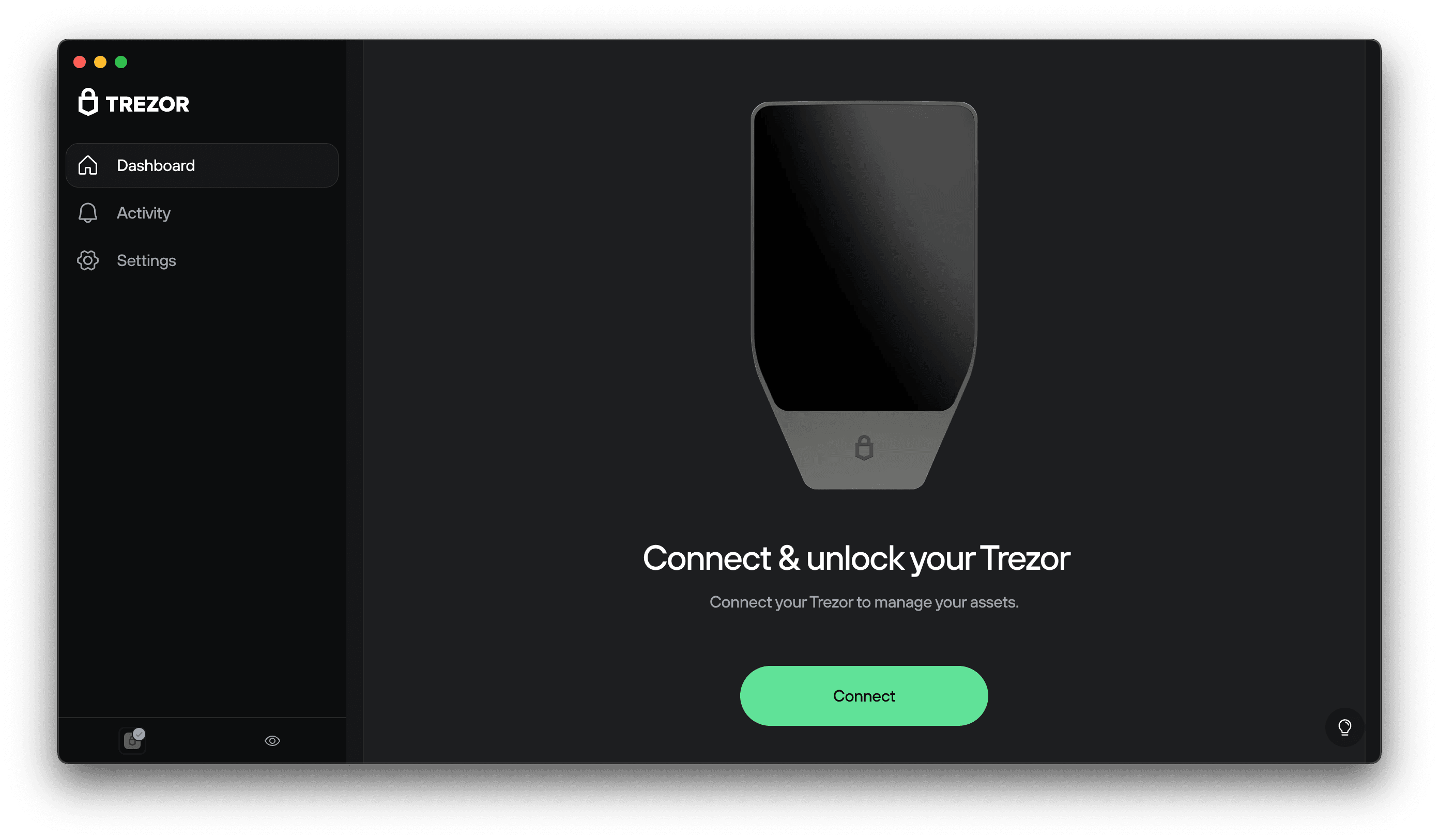
Plug in your Trezor Model One using the Micro-USB cable.
After connection, Suite will display the Device security check.
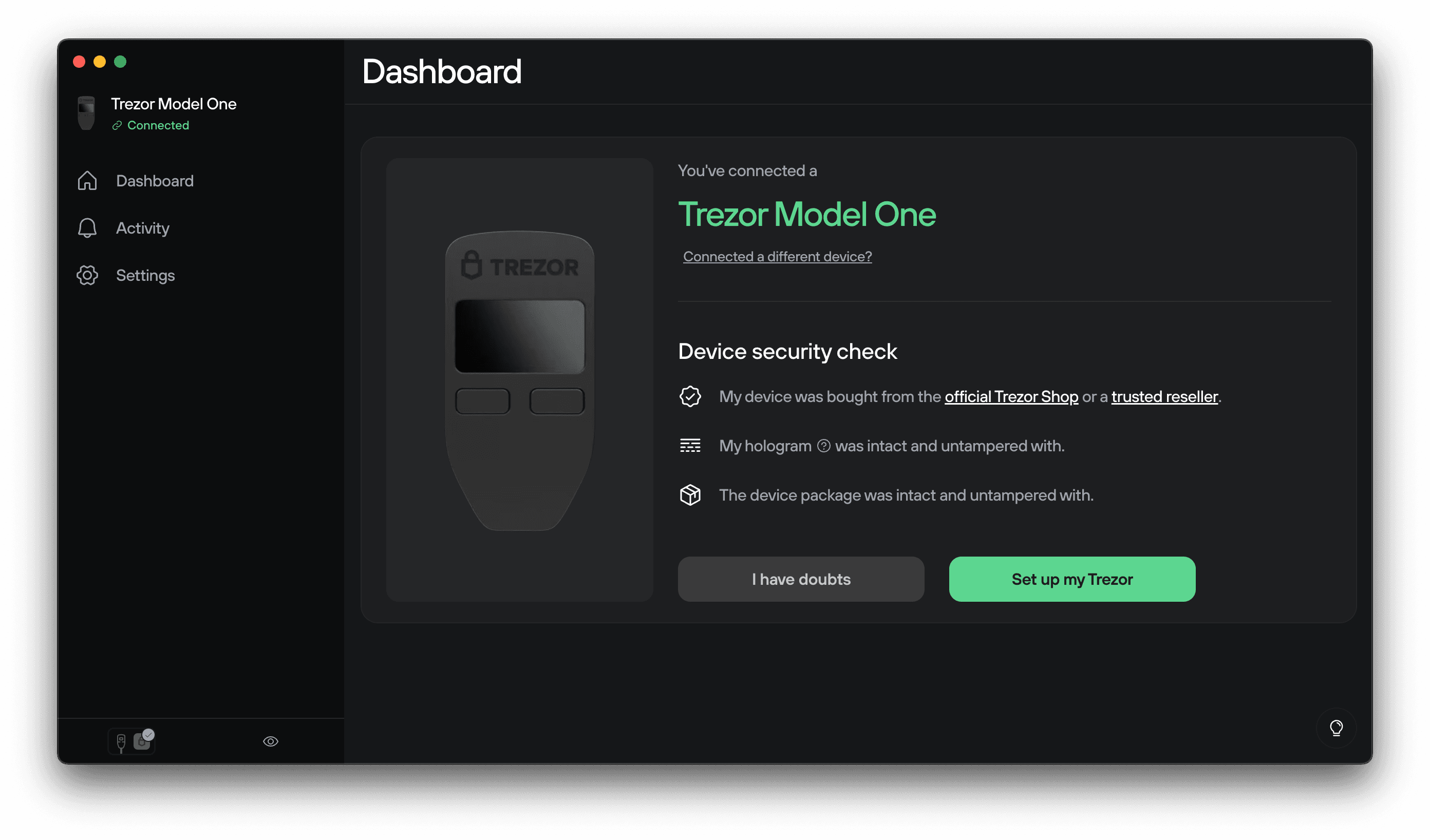
If anything looks unusual, see Authenticate your Trezor Model One for guidance on verifying your device.
3. Install firmware
Your Trezor ships without for security.
Trezor Suite will guide you to install the latest version of the firmware.
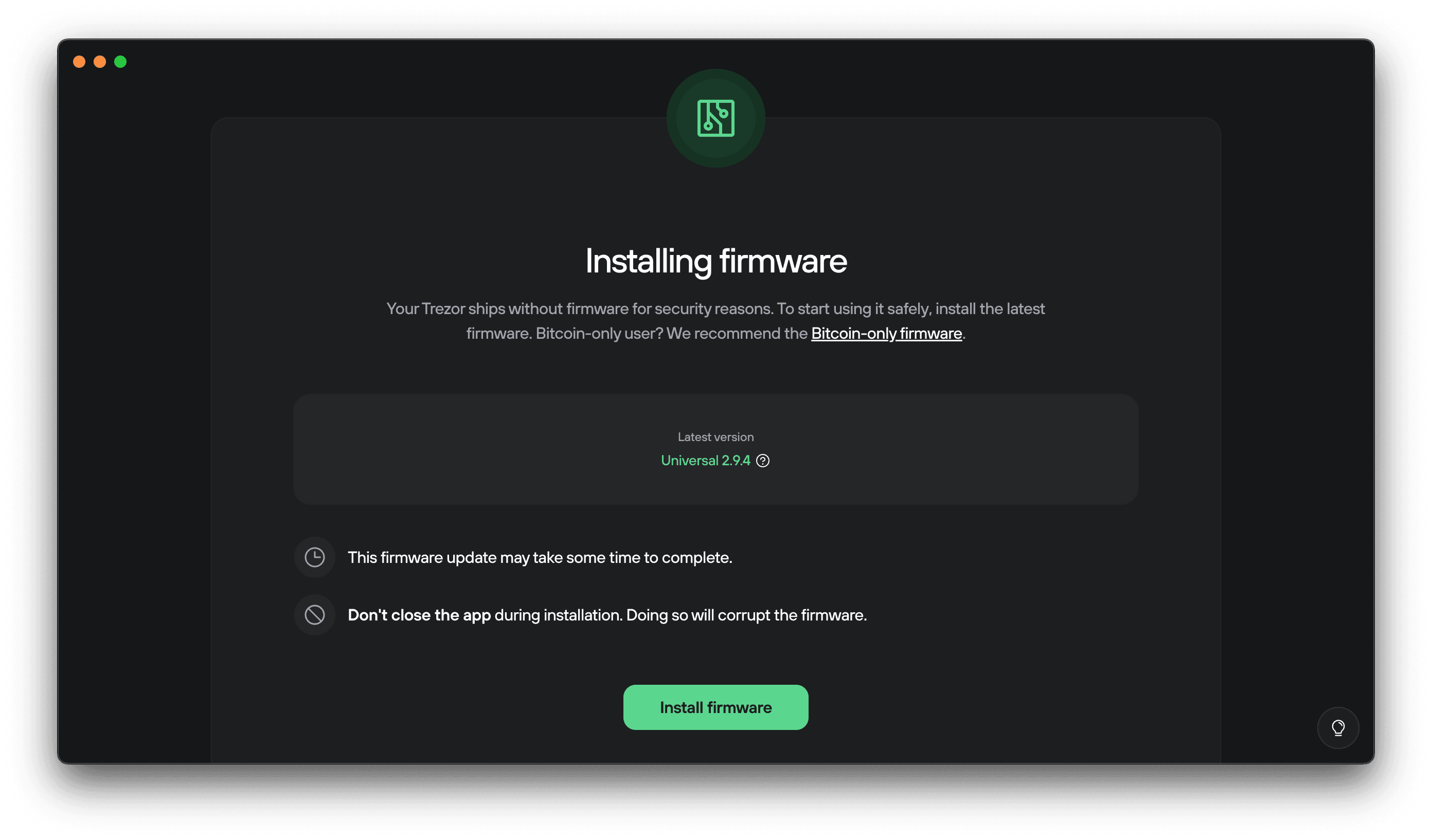
You can choose between Standard or Bitcoin-only firmware.
Click Install firmware and wait for the installation to complete.
Your Trezor will restart automatically.
4. Create your wallet and make a backup
Trezor Suite now guides you through creating your wallet and your wallet backup.
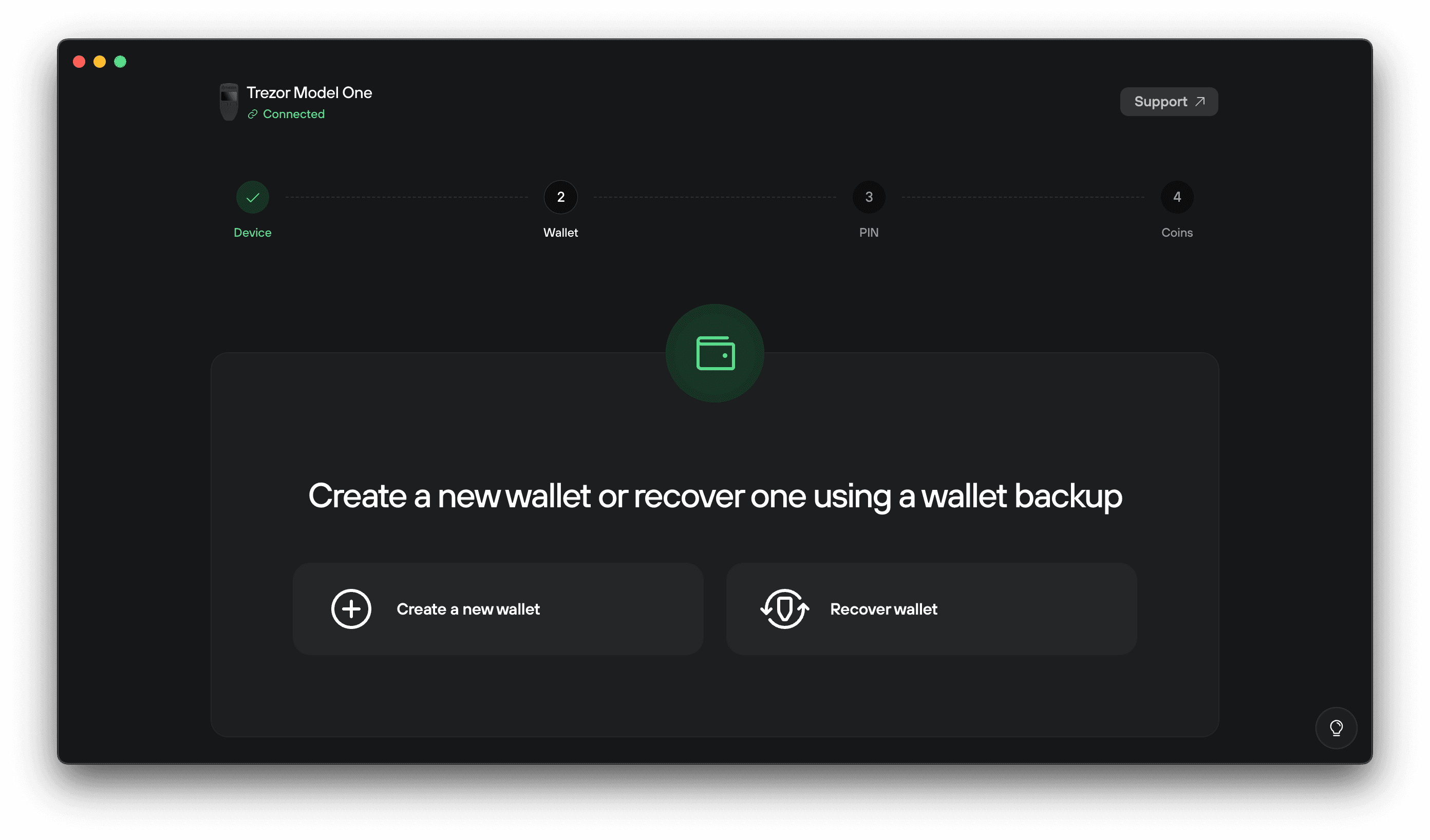
Click Create a new wallet if this is your first setup, or Recover if you’re restoring one from an existing backup.
Click Create wallet. Your Trezor will ask you to agree to the Terms of Use. Press the right button to confirm.
Then on Trezor Suite, click Continue to wallet backup. Trezor Suite will show you backup instructions. Read them carefully and confirm you understand by checking the boxes.
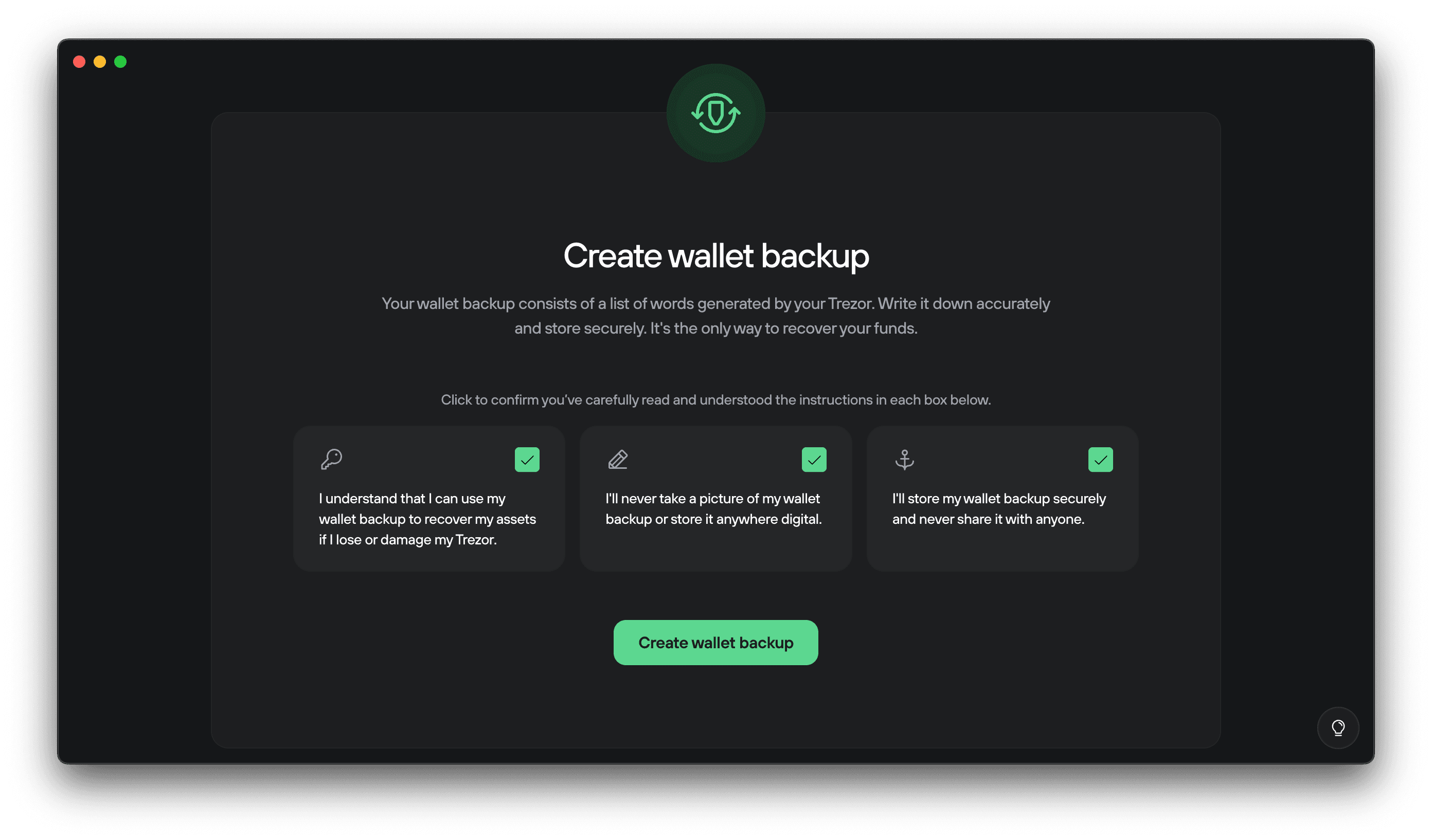
Once you have reviewed those messages, click Create wallet backup.
The Trezor Model One uses a 24-word backup. For a detailed explanation of backup standards and number of words, see Understanding Trezor wallet backups
Write down your 24 words:
Your Trezor Model One will display 24 words, one by one. These words form your wallet backup and are the key to restoring access to your wallet.
Your backup is the only way to recover your wallet. Write all 24 words in the exact order on one of the provided recovery seed cards. If the words are lost or written incorrectly, your wallet cannot be recovered.
Press the right button to see the next word.
After you reach word 24, your Trezor will display all 24 words a second time. Use this to verify you've written them down correctly.
Keep your backup written on paper or metal and stored safely offline. You'll only need to type these words to recover your wallet or check your backup. Only type your words in Trezor Suite if your Trezor Model One instructs you to do so. Never share your backup with anyone. Fake Trezor apps and websites can look realistic but are designed to steal your funds.
5. Set a PIN
After your wallet backup is created, Trezor Suite will ask you to set a PIN.
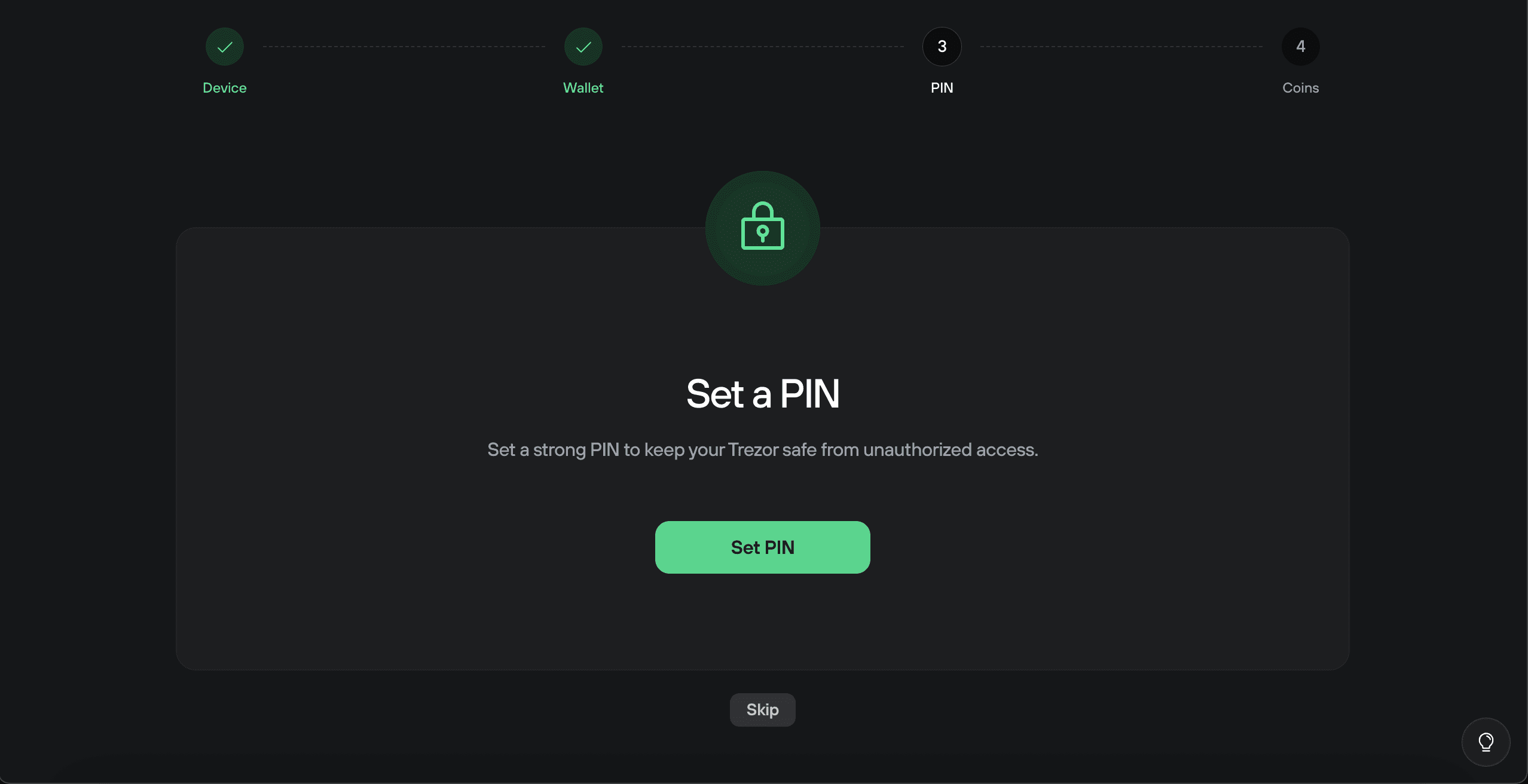
Your PIN protects your device from unauthorized access.
Click Set PIN and follow the on-screen instructions.
Your Trezor Model One uses a scrambled PIN grid for security. This allows you to enter your PIN using your computer without revealing the actual PIN to the computer.

- Look at the grid on your Trezor screen
- Click the corresponding positions in Trezor Suite to enter your PIN
- The grid scrambles after each entry for security
- Use a PIN of at least 4 digits. You can use up to 50 digits.
- Avoid simple sequences (for example, '12345') and numbers that are personally meaningful (birthdays, etc.).
- You can change the PIN later in Settings → Device.
- The device allows 16 incorrect PIN attempts.
- After 16 incorrect PIN attempts, the wallet will be erased from the Trezor device. You can only restore your wallet with the wallet backup (recovery seed).
To learn more about creating and managing your PIN, see PIN protection on Trezor devices.
You can use the space provided on your recovery seed card if you want to write down your PIN. Always keep your wallet backup private and offline.
6. Activate assets
The last step is to select which cryptocurrencies you want to manage in Trezor Suite.

By default, only Bitcoin is enabled. Click to select any additional assets you’d like to use. For a full list of supported assets, visit trezor.io/coins
You can change these selections anytime later in Settings → Coins.
You don’t need to enable every coin now. You can always add or remove assets later without affecting your wallet or backup.
7. Setup complete
You’ve successfully set up your Trezor Model One.
You’re now ready to send, receive, and manage your crypto securely.
Next steps after setup
- Verify your wallet backup using the recovery check feature in Trezor Suite. This lets you enter your backup words on the device to verify that they are correct. This ensures you recorded your backup accurately. For detailed steps, visit Check backup on Trezor Model One.
- Receive crypto into your wallet
- Buy crypto directly in Trezor Suite